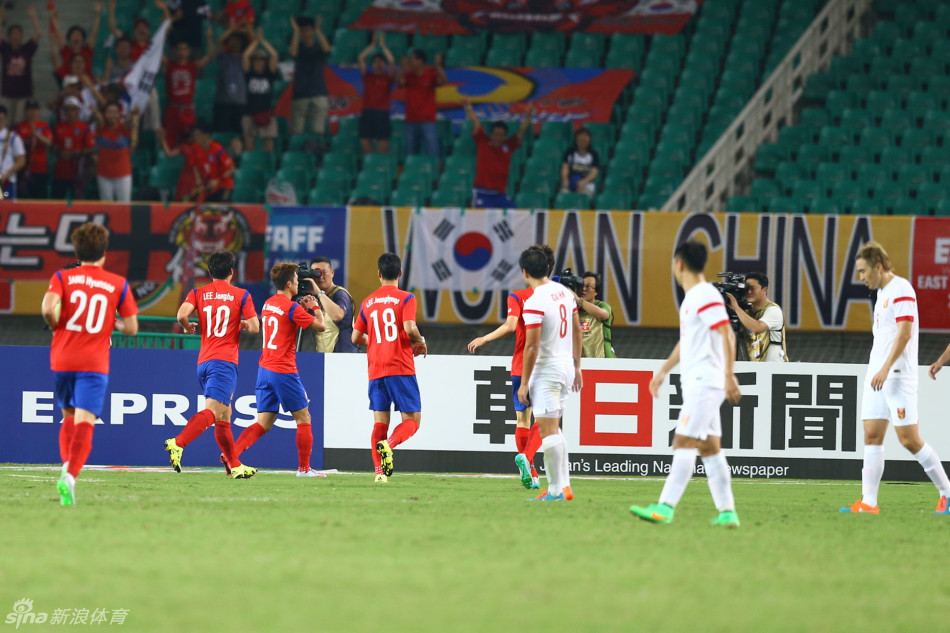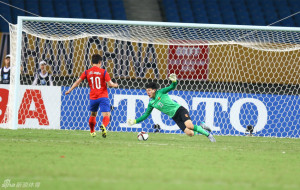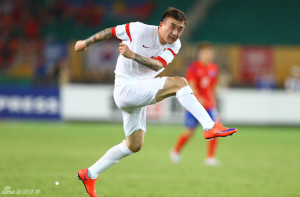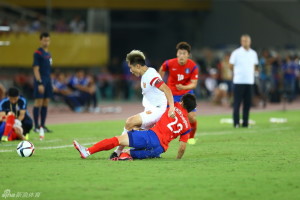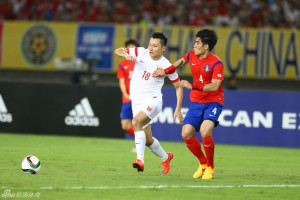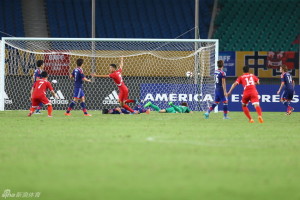China were comfortably dispatched by a well drilled and supremely fit South Korean team in their East Asian Cup opener in Wuhan on Sunday. Kim Seung-dae opened the scoring just before half-time and Lee Jong-ho added another in the 57th minute to give the South Koreans a two goal victory which doesn’t accurately reflect how much they dominated the game.
EAFF East Asian Cup
China 0
South Korea 2
Kim Seung-dae 45′
Lee Jong-ho 57′
There were few clear cut opportunities in a cagey opening half hour during which South Korea generally controlled proceedings without being able to find many clear cut breakthroughs. As the first half wore on, however, the South Koreans’ relentless pressing and slick passing looked increasingly likely to bear fruit, with China struggling to stamp any kind of a mark on the game.
A warning shot was fired in the 36th minute when Kwon Chang-hoon headed over a Lee Jong-ho cross while in acres of space in the penalty area. The opportunity came when harried Chinese centre back Feng Xiaoting played a poor pass to left back Ren Hang resulting in a loss of possession, and it was a sign of things to come.
With half-time approaching, Feng made a challenge in midfield and stood around watching the loose ball instead of returning to his position. The Koreans quickly regained possession and the ball made its way to Lee Jong-ho on the right. The 23-year-old, who was winning his first national team cap, cut inside and, despite being surrounded by Ren Hang, Cai Huikang and a returning Feng, was afforded plenty of time to thread a pass into Kim Seung-dae . A stumbling Zheng Zhi, whose starting role at centre back was the big pre-game talking point, was unable to cut the pass out and Kim, also making his debut, was left free to sweep the ball past a helpless Wang Dalei.
In the second period, the Koreans continued to dominate and the game was effectively over as a contest twelve minutes after the interval. Wang Yongpo, making his first appearance for the national team in over a year, was dispossessed in his own half by Kim Jae-sung and the Jeonbuk Motors winger quickly rolled a through ball into the path of Lee Jong-ho. With the Chinese defence in chaos, Lee squared to Kim Seung-dae who forced the ball past an onrushing Wang Dalei before claiming a final, decisive touch to make it 2-0.
The goal took the wind out of the sails of both Chinese fans and players, with many of the officially announced 41,000 (more likely between 30-35,000) in attendance expressing their frustration towards the team.
Half-time substitute Sun Ke offered some hope going forward and he was responsible for China’s best chance of the game when he cut in from the right-wing and fired off a shot that forced Korean goalkeeper Kim Seung-gyu to parry into the path of Yu Hai. With the goal at his mercy, though, the Shanghai SIPG winger, who was about to be withdrawn after picking up a knock a few minutes earlier, completely scuffed his effort to the consternation of the local support.
Yu finding the net would have offered little more than false hope, though, as the Koreans continued to belie the hot, humid night with their endless pressing. By this point, simple passes from the Chinese were going wildly astray and large sections of the crowd began turning on the team. Manager Alain Perrin effectively flew the white flag in the 74th minute when he brought on defensive midfielder Liu Jianye for the more attack minded Wang Yongpo and this coincided with many in the stands began heading for the exits.
Sun Ke, by now playing on the left wing, did have one last chance to find the net when he shot just wide in the 78th minute, but a goal for China would have been unfair on the Koreans who continued pressing until the very end – long after it seemed like their opponents had already given up. Among those still in attendance, the final whistle was greeted with a mix of boos, ironic cheering and defiant shouts of support. However people chose to respond, though, everybody, with the exception of the tiny pocket of South Korea supporters behind one of the goals, knew that they had seen their team comprehensively beaten by a superior side.
What went wrong?
There’s plenty to criticise about the Chinese performance but it would be unfair to not first acknowledge an excellent display from an understrength South Korean team. Only four members of the starting line-up were in the squad which made it to the Asian Cup final in January, but the side still played very well on both a collective and individual basis.
Along with goalkeeper Kim Seung-gyu, the other three starters from the Asian Cup squad were the Chinese based defensive axis of Kim Ju-young, Kim Young-gwon and Jang Hyun-soo. Holding midfielder Jang did a fine job protecting the Kims at centre back and Kim Ju-young looked particularly strong and assured on the rare occasions he was called on to do his defensive duties.
Central midfielder Kwon Chang-hoon’s endless running in the Wuhan heat was borderline superhuman and the inexperienced attacking midfield trio of Lee Jong-ho, Kim Seung-dae and Lee Jae-sung linked up excellently at times.
There is no doubt, though, that China were poor and a big reason for that was the starting line-up. Perrin’s squad selection already suggested he was prioritsing results over player development and that was made clear when he made the surprising decision to play 34-year-old midfielder Zheng Zhi at centre back, rather than take a chance on one of the inexperienced players at his disposal. The captain often played in the middle of defence earlier in his career, but seldom does these days, and he clearly struggled with his positioning on several occasions.
The knock on effect of dropping Zheng into the back four was an alteration in midfield which saw Perrin opt to play with a 4-1-4-1 instead of the usual 4-2-3-1. A seemingly minor change on paper, it placed Wang Yongpo and Wu Xi in the middle of the four and left Cai Huikang alone to shield the defence. Protecting the back four is certainly Cai’s role in any team he’s in, but he usually does it as part of a two. To put it politely, the Shanghai SIPG man carries a little more excess weight than the average professional football player, and he was unable to keep up with the quick and relentless movement of the Koreans.
Wang Yongpo’s return to the international fold had been unsuccessful even before the error that led to the second goal, but his being replaced by Liu Jianye in the 74th minute was effectively an admission from Perrin that Cai couldn’t cope with his defensive midfield duties by himself. Wu Xi kept up well in the first half, snuffing out a dangerous one-two in his own area not long before Korea opened the scoring, but he offered little creativity going for ward and tired as the game went on. This begs the question as to why Wu didn’t just play in a more withdrawn role alongside Cai from the beginning, which would surely have stifled the Koreans more effectively.
Defensively, Feng Xiaoting looked composed in the early stages but seemed to lose his nerve after playing a poor pass which almost led to a South Korea goal in the 36th minute. From then on, he appeared more anxious on the ball and less assured in his positioning.
Ren Hang overcame an early booking to put in a reasonable display, although he was guilty of not closing Lee Jong-ho down quickly enough when he crossed for the first goal. Neither Ren nor right back Ji Xiang were able to get forward much, and the latter struggled as the game went on. His defending became worse, and his distribution increasingly erratic as the Koreans harried him
Things were no better in attack where Gao Lin once again struggled in the lone forward role for the national side. Admittedly, Gao was largely limited to chasing down long balls but, when he wasn’t being caught offside, he was being comfortably manhandled by South Korea’s centre-backs – an incident where he threw himself to the ground after being efficiently, and legally, eased off the ball by Kim Ju-young summing up his night.
With Yang Xu not fully fit, Sun Ke replaced Gao at half-time and took Wu Lei’s spot on the right-wing with Wu going up top. The Shanghai SIPG man had barely touched the ball in the first half and was anonymous in the centre forward role, too. He was later replaced in the position by Yu Dabao, who had come on for Yu Hai, but by this point, China were ceding possession cheaply and the Beijing Guo’an attacker was given no chance to score for a fourth international in a row.
Sun Ke was the one bright spot in an otherwise lackluster attack, and it would not be a surprise to see him start against North Korea on Wednesday. One also wonders when Liu Binbin will be given a proper opportunity to use his talents on the international scene.
What’s next?
Next up for China are North Korea who sprang a surprise in the East Asian Cup’s opening game by beating Japan 2-1. Things looked to be going according to script when Yuki Muto put the Japanese one up in under three minutes, but the inexperienced Samurai Blue showed little desire to score a second and allowed their opponents back into the game.
Japan could have sealed the victory with better finishing, particularly from Nagai Kensuke who squandered three good opportunities, but the unfancied North Koreans kept going and equalised in the 78th minute when Pak Hyon-il headed down a long ball for Ri Hyok-chol to run onto and score. The underdogs weren’t done, though, and Pak’s powerful header gave them the win with two minutes of regulation time remaining.
The late nature of North Korea’s goals may suggest a smash and grab, but this was far from a lucky win. Most of the Japan team had just been involved in mid-week J-League matches and, with many of them lingering over every stoppage in play so they could take on more water, it was clear they were struggling in Wuhan’s early evening heat.
Conversely, the North Koreans had already been in camp preparing for this competition for some time and looked fitter and more determined than their opponents.
Playing in what was pretty much a classic English 4-4-2 with a big man/little man striking combination, they relied on long balls, crosses and aggression to make up for their obvious technical inferiority. The diminutive Ri Hyok-chol played the little man role and demonstrated the danger he poses when allowed to get in behind the defence by scoring the opener.
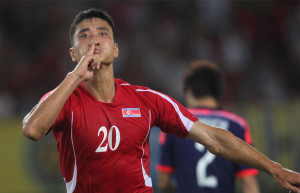
Pak Hyon-il was involved in both North Korean goals and was a serious aerial threat after h came on in the second half
Ri was easy to shrug off the ball, however, and the real key to the attack was Pak Hyon-il who came on as a substitute to replace Jong Il-gwan as Ri’s strike partner in the 66th minute. This changed the game as the very tall Pak used his aerial prowess to set up the first and score the second. He will pose a serious threat to China on Wednesday if the North Koreans are allowed to get high balls into him.
Despite their differing fortunes this past Sunday, China are still a better team than North Korea. The North Koreans were certainly gallant in their opener, but they were assisted by a lethargic Japanese team and were also buoyed by strong support from the Chinese crowd who enjoyed seeing their old enemy taking a beating.
When these two sides meet on Wednesday, it’s hard to imagine China displaying less energy than Japan did and the North Koreans will obviously no longer enjoy the support of the crowd. That being said, if things don’t go well for China early on, an anxious crowd and a direct, aggressive opposition could combine to make Wednesday night another unpleasant one for Guozu.
